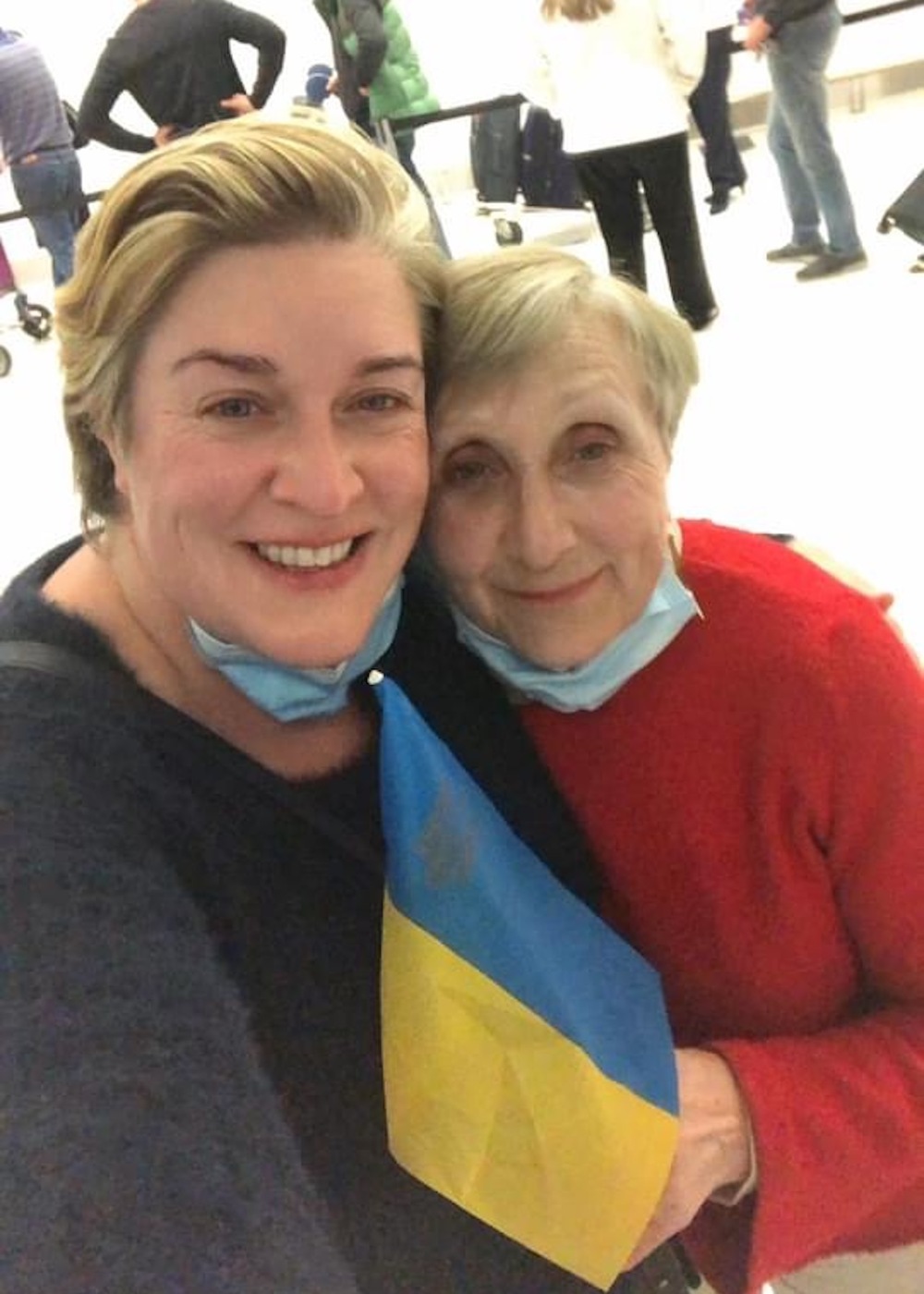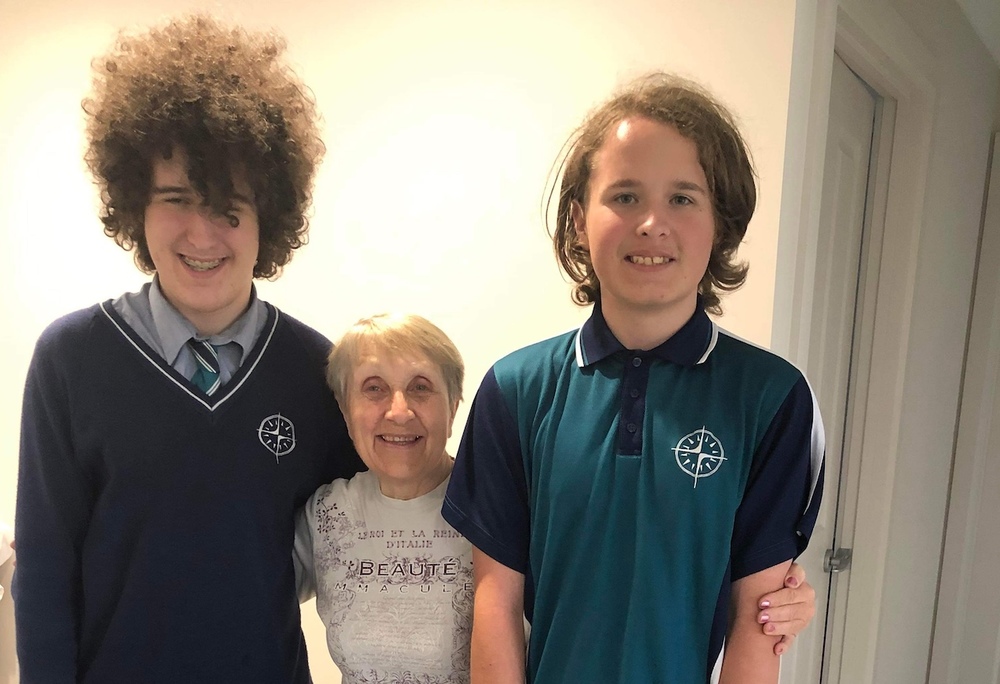From Ukraine to Hindmarsh Island
Caroline Horn
12 April 2022, 10:33 AM
 Mariya and Oksana at home on Hindmarsh Island
Mariya and Oksana at home on Hindmarsh IslandTen days ago Mariya Samkova left her fourth floor apartment in Khmelnytskyi not knowing if or when she would be able to return home.
She was at the start of a 16-hour bus journey across Ukraine to Poland. From there she would fly to the safety of her daughter’s house on Hindmarsh Island
In South Australia, her daughter Oksana and grandsons, Ilya and Aden, waited for updates of her progress through the Ukrainian countryside, the Polish border crossing and into Warsaw.
It had taken some time for Oksana, a nurse working in Victor Harbor, to convince Mariya to join her in South Australia.
“I couldn’t leave her there by herself,” Oksana says. “My father Anatoliy passed away three years ago and my brother died last year, so she had no-one.”
Since the start of the Russian invasion she had worried about her mother. Air raid sirens now interrupted their phone calls.
“I would say, go to the bomb shelter and she’d say, “oh I’ll be fine,” Oksana says.
The sirens were sounding as many as eight times a day and the outskirts of Khmelnytskyi had suffered damage.
“People were tired, going all the time to the shelters. Some of them go, some of them don’t,” Oksana says.
“Every time I phoned her, and she doesn’t answer I go into a state because I don’t know what’s happening.”
Mariya, a retired teacher, was hesitant to leave, telling her daughter she should stay and help but eventually Oksana convinced her to come to Australia.
Oksana told Mariya if she could only bring a few things, to bring the things that she could not replace
So, Mariya took all her photographs from their frames and albums and packed them in a suitcase.
“Twenty-six kilograms it weighed,” Oksana says with a smile.
Once Maria agreed to leave, Oksana applied for a visa for her mother.
“I applied in the morning and within three hours it was granted,” she says. "Unheard of!"
The coach Mariya boarded that morning was packed with others trying to reach safety, most with children and many with pets.
She had to leave her beloved cat behind but a friend has promised to care for him.
Mariya says the driver went as fast as he could - so fast that many of the other passengers were scared but they understood that he didn't want on the road any longer than he had to be.
Back home in Australia, Oksana arranged a place for Mariya to stay in Warsaw. The hotel staff welcomed her with open arms and made sure she made it to the airport for her flight.
“It was like my soul expanded and exploded with happiness,” Mariya says of the moment she saw her daughter again after landing at Adelaide Airport last Tuesday.
“We all cried,” Oksana says. “We both just stood there and hugged and cried. Can’t believe that she’s here.”

Mariya and Oksana at Adelaide Airport
Only a few days after arriving Mariya is over her jetlag and has already nearly filled Oksana's fridge with Ukrainian food.
She remains connected to friends in her hometown, as they wait and wonder where the Russians will strike next.
“She checks in with them every morning and evening,” Oksana says.
Maria says she feels relieved to be in Australia but also has feelings of guilt that she left.
If she were younger, she says, she would have stayed and fight the invaders herself.
Now she is determined to do what she can to raise money to help her fellow Ukrainians.
She is already planning a Ukrainian Lunch to help raise funds and say thank you to everyone who helped to get her to Oksana's home.
She says she also wants to volunteer while in Australia, to help the elderly or teach needlework or cooking.
The Ukrainians will win this war she says, because they are fighting for the land they love.
Oksana has family living in Russia and says the version of events people living there is “completely filtered”.
She emails her cousins but they are unable to open the information she sends them.
The campaign of misinformation and concealment is familiar to her after being a student in Soviet schools.
She recalled how her grandmother would speak of starvation and having to eat weeds.
“I thought that was during the war (World War Two) because I couldn’t place it,” she says.
“Then, when I left Ukraine and someone said, oh Ukraine, what about this famine, I’m like, what famine? This Great Famine. I never heard of it."
“Because in schools we’ve never been taught. No one spoke about that because it was artificially induced.”
The Holodomor, or Great Famine, killed millions of Ukrainians in the 1930s but was not officially mentioned by the Soviet authorities until the 1980s.
“If you took any food from the field you worked on, you’ll be considered as an enemy of the state and you’ll be sent away,” Oksana said.
“My great-grandfather was sent away by Stalin to Siberia because he wouldn’t give a horse away – a working horse.”
“They never saw him again. He was sent to a concentration camp in Siberia."
"So many people disappeared and died like this.”
“Lots of things have been induced to Ukraine through the years and when we became independent, we became really excited because it was like, at last we can do what we want.”
“I remember exactly the time because my dad was posted to Mongolia and then the Perestroika happened.
The Soviet Union collapsed, and my dad had to choose - because he was Ukrainian in the Soviet Army - whether to choose to join the Russian or Ukrainian Army.”
He chose the Ukrainian Army and Mariya says she has no doubt that if he was still alive, Colonel Anatoliy Samkova would be fighting the Russians now.
She is proud of her people and says President Zelenskyy has become a symbol of bravery for all Ukrainians.
“People without weapons, standing in front of the tanks,” she said. “The Ukrainians are taking it for the whole of Europe, from Russia.”
“What’s next in his (Putin’s) idea if we don’t stand against him?”
“How many people died in the second world war?
“You need to fight back. We can’t let history repeat.”
“If only they believed Ukrainians when they were saying we need help because this is all Russian propaganda, people keep killing and dying but no one took it seriously. For eight years.”
“The world didn’t believe until this happened.”
“Putin says he is saving the Ukrainian people.”
“But from who?”
If you would like to support Ukrainians in need, the Association of Ukrainians in SA is fundraising for their Ukrainian Crisis Appeal.
To find out more visit their Facebook page or join their mailing list.

Mariya and her grandsons, Ilya and Aden